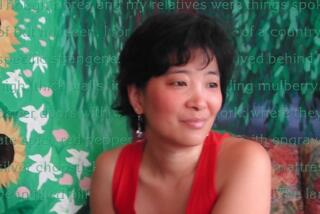What She Saw at the Revolution
- Share via
Along march ago, a college friend of mine and his father were practically the first American visitors to mainland China--after the Ping-Pong players yet before the diplomats. They were granted entry because my friend’s father was obsessed with China. A suburban Styrofoam manufacturer, he had applied for a visa every year for decades before they were available. Why was this man so drawn to China? Well, during World War II, his job, as a GI stationed in Asia, was to take cigarettes to our Japanese enemy’s guerrilla enemy, Mao Tse-tung.
From Canton to the Great Wall, people begged to see a talismanic object my friend’s father carried with him. The object that opened every door in the country--indeed, it had opened the door to the country--was a blurry 30-year-old black-and-white photograph of the smiling young soldier sitting on a jeep next to Mao. The magic of that image came to mind as I read “Wild Ginger,” the latest book by Chinese-born novelist and memoirist Anchee Min.
Like Min’s previous works, “Wild Ginger” is set in the era of China’s so-called Cultural Revolution, when Mao was ubiquitous. Every building was plastered with posters of the sun-like leader, red rays emanating from his head. Every jacket had multiple Mao buttons pinned to its breast. Every hand clutched the Little Red Book. And every individual dreaded the consequences of individualism.
Maple, the teenage schoolgirl who tells “Wild Ginger’s” story, is an independent thinker who regularly suffers the indignities of a political playground bully named Hot Pepper. She feels like an outsider to the pervasive belief system. Then a true outsider arrives, the eponymous Wild Ginger.
Ginger may have the soul of a Maoist--she certainly has the will--but, unfortunately, she doesn’t have the eyes. That’s because her father, a Frenchman who died when she was young, imparted a distinctly un-Chinese cast to her features. It’s one thing when an adolescent accuses another of looking funny, but it’s entirely different when looking funny means you are the embodiment of a counter-revolutionary attitude that must be expunged by all right-thinking people. Any schoolyard is fraught with the desire to belong, even more so one in the midst of a nation in which students “studied no other countries besides Russia, Albania, and North Korea
Maple yearns to adapt to China’s extreme version of political correctness as a way to succeed, but Wild Ginger is a true believer. She accepts the notion of guilt by birth that deprives her of the prize she deserves in the district’s Mao-Citation Quoting Contest. Leaving the school world behind, she finds work in a miserable fish market, scavenging tails, scales and intestines until she detects thievery in the market, though the thieves’ sin may be less a matter of criminal behavior than of incipient capitalism. Overnight, she becomes a national heroine. She meets Mao and is suddenly as talismanic as my friend’s snapshot. “By touching her, [people] felt that they had touched Mao,” a condition akin to “attaining the state of Nirvana for a Buddhist.”
Writing with restraint and clarity, Min shows Wild Ginger, now an official Red Guard, with the power to condemn people to death yet without the emotional tools to deal with her attraction for Evergreen, a slightly older Mao-spouting boy. Sex, she believes, is inappropriately bourgeois for the vanguard. Thus the frustrated Evergreen turns to Maple while Wild Ginger seethes and eventually plots to ruin both her former friend and the young man whose love she scorned.
The final catastrophe of “Wild Ginger” inheres in the lures of absolutism. Min’s lament for wasted years and wasted lives under tyranny is potent, and the image she creates of a world marching lock-step is as chilling as her casual mention of “mind-brushing schools” for those out of step. Unfortunately, her characters seldom step out of the preordained roles dictated by their allegorical names. Hot Pepper is diabolic, and Wild Ginger too intense to endure. Maple is strong, Evergreen steadfast. Only when the latter two giddily arouse each other with seditiously misused quotations from the Chairman do they begin to rebel against both the society they are stuck within and the rigid format of this earnest but didactic novel.
More to Read
Sign up for our Book Club newsletter
Get the latest news, events and more from the Los Angeles Times Book Club, and help us get L.A. reading and talking.
You may occasionally receive promotional content from the Los Angeles Times.










